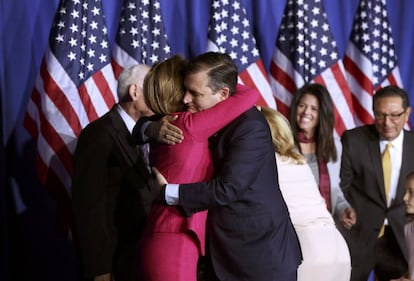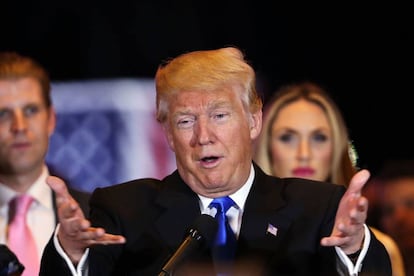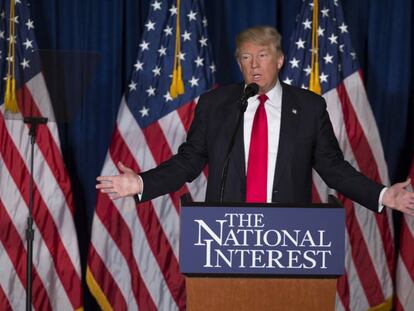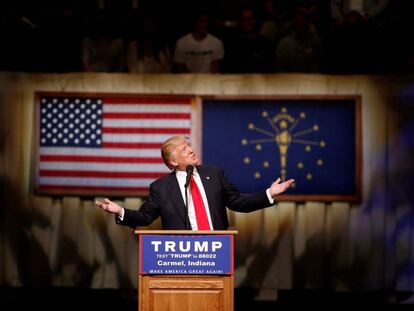Ted Cruz quits White House race, paving the way for Donald Trump
Controversial billionaire becomes the “presumptive Republican nominee” after a strong victory in Indiana
Republican senator Ted Cruz dropped out of the US presidential race on Tuesday after losing the Indiana primary to real estate tycoon Donald Trump. His decision paves the way for Trump to clinch the Republican presidential nomination at the party’s July convention. His only remaining opponent is John Kasich, who has very few delegates but remains a candidate, according to his campaign aides.

The chairman of the Republican National Committee, Reince Priebus, called Trump “the presumptive GOP nominee,” using the political jargon for candidates who have yet to arithmetically become so.
Priebus put aside past disputes and called on the party to embrace the billionaire New Yorker: “We all need to unite and focus on defeating Hillary Clinton,” he wrote on his Twitter account following Cruz’s exit from the race.
The Texas senator, who had won in nine states and added 565 delegates, had made Indiana a central goal of his campaign. Theoretically, this was fertile territory for him: the state has a solid base of conservative and religious voters, and Republicans have won here in nine out of the last 10 presidential elections.
A democratic victory for Bernie Sanders
In the Democratic front, Bernie Sanders beat Hillary Clinton with a five-point lead that breathes new life into his campaign after bad results in recent votes. Unlike the Republican system, however, Democratic primaries share out delegates proportionally, meaning that the Indiana results barely alter Clinton’s solid lead over her rival.
Before Indiana, the former state secretary was already caressing the Democratic nomination with 2,165 out of the 2,383 delegates she needs, including the so-called superdelegates who can vote for whomever they want at the July convention.
Cruz is an orthodox conservative with affinities to the Tea Party, and an ardent champion of constitutional limits and religious freedom. In recent weeks, Trump’s belligerent attitude, coupled with his lack of political experience and inflammatory rhetoric, had made Cruz look by comparison like a calm, level-headed candidate who is open to dialogue – itself a far cry from the early combative spirit that Cruz had displayed in the Senate.
But the strategy has proven futile. The results in Indiana confirmed Trump’s advance with a 17-point victory that opinion polls had already been forecasting. Cruz was unable to avoid defeat despite his attempts at mobilizing voters with support from the governor of Indiana, his announcement of a running mate, and his surprising deal with Kasich by which the latter agreed not to campaign in that state.
“I said I would continue on as long as there was a viable path to victory. Tonight, I’m sorry to say it appears that path has been foreclosed,” said a serious-looking Cruz as he announced that he was ending his bid.
Trump’s victory in the Midwest state is his 28th in three exhausting months of back-to-back votes and rallies. If he wins in all the districts, Trump will claim all 57 delegates at stake in Indiana, and bring his total to 1,053, out of the 1,237 which he needs to guarantee his own presidential nomination to the November election.
Sign up for our newsletter
EL PAÍS English Edition has launched a weekly newsletter. Sign up today to receive a selection of our best stories in your inbox every Saturday morning. For full details about how to subscribe, click here.
Arithmetically, Trump now needs 184 delegates to clinch the title. The most pessimistic forecasts, made before Cruz’s resignation, gave him around 120 at the primaries in West Virginia, New Jersey, Washington, Oregon and New Mexico. He could easily manage the rest in California, which has 172 delegates and where Trump is leading the polls.
After Cruz’s announcement, Trump made an appearance of his own at his Manhattan skyscraper, the Trump Tower. Looking earnest, he praised the senator, calling him “one hell of a competitor,” as well as a “smart tough guy” with “an amazing future” ahead of him.

Trump also praised Priebus, saying he will bring the “unity” that the party needs, and suggested that trade will be one of his main angles of attack against his likely Democratic rival, Hillary Clinton. “She will not be a good president, she doesn’t understand about trade,” he stated, then went on to accuse her husband, former president Bill Clinton, of signing “the worst free trade agreement in history” in reference to the 1993 agreement with Canada and Mexico.
English version by Susana Urra.
Tu suscripción se está usando en otro dispositivo
¿Quieres añadir otro usuario a tu suscripción?
Si continúas leyendo en este dispositivo, no se podrá leer en el otro.
FlechaTu suscripción se está usando en otro dispositivo y solo puedes acceder a EL PAÍS desde un dispositivo a la vez.
Si quieres compartir tu cuenta, cambia tu suscripción a la modalidad Premium, así podrás añadir otro usuario. Cada uno accederá con su propia cuenta de email, lo que os permitirá personalizar vuestra experiencia en EL PAÍS.
En el caso de no saber quién está usando tu cuenta, te recomendamos cambiar tu contraseña aquí.
Si decides continuar compartiendo tu cuenta, este mensaje se mostrará en tu dispositivo y en el de la otra persona que está usando tu cuenta de forma indefinida, afectando a tu experiencia de lectura. Puedes consultar aquí los términos y condiciones de la suscripción digital.










































